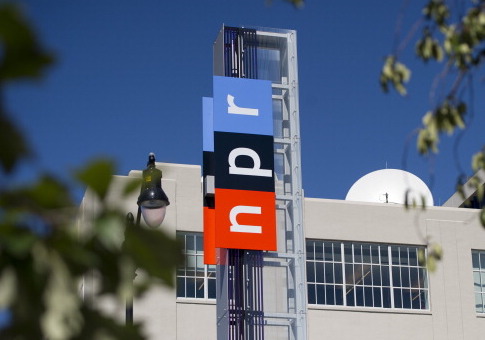Did We Know That a Russian Software Company Behind the Hacks Was an NPR Corporate Donor
What does this say about National Public Radio? Its left leaning viewpoint has been obvious from its beginning. Accepting money from an enemy based software company stretches the fiber of reality. What were they thinking? Perhaps they knew what they were doing?
Even if NPR were so idealistic as to be clueless, at the very least, wouldn't someone in the organization have had the intelligence to question the optics?
The last paragraph in the article below contains "explanations" and disavowals. NPR's termination of its relationship with Kaspersky appears to be disingenuous at best. The irony is that here is a real case of a media outlet doing business with Russia, which is being ignored.
The often used statement, "nobody can be that stupid", comes to mind.
NPR Says Russian Software Company Behind Hacks Is No Longer a Corporate Underwriter
NPR ran ads from Kaspersky Lab on Wednesday morning
National Public Radio told the Washington Free Beacon that the Moscow-based software company Kaspersky Lab, which was used by hackers to steal classified documents from the National Security Agency, is no longer one of its corporate underwriters.
NPR was still airing ads from Kaspersky on Wednesday morning and was disclosing Kaspersky Lab as a corporate sponsor in news reports last week. U.S. officials suspect the company has ties to the Kremlin—its antivirus software has been banned from U.S. government computers.
Russian hackers have been using Kaspersky Lab antivirus software as a gateway for hacking, including a home computer used by an NSA employee. Kaspersky antivirus software, which is used by roughly 400 million people worldwide, has access to every file on a computer where it is installed. Hackers backed by the Russian government weaponized Kaspersky software "into a sort of Google search for sensitive information."
The Free Beacon asked NPR on Wednesday about Kaspersky's corporate sponsorship. On Thursday, a spokesperson said Kaspersky is no longer a corporate underwriter.
"Kaspersky Labs has been a sponsor of NPR for several years, but are no longer a current sponsor," said Isabel Lara, an NPR spokesperson.
Lara said the corporate sponsorship did not end abruptly.
"The prior funding ended earlier this month and the credit schedule ran its course," she said.
NPR stations were still airing funding sponsor ads for Kaspersky on Wednesday morning, touting the Moscow company as a protector against "cyber theft" and "online threats."
"Support for NPR comes from … Kaspersky Lab internet security," the NPR narrator said. "Giving 400 million users the power to protect their money, privacy, computers, and mobile devices from cyber theft viruses and other online threats. Learn more at Kaspersky.com."
One listener questioned why NPR was still airing ads for Kaspersky, asking on Twitter, "Don't [you] know this news?"
Lara also said corporate sponsorship is separate from the newsroom, and journalists have no role in selecting sponsors.
"It is also important to understand that funding from corporate sponsors and philanthropic donors is separate from the editorial decision making process in NPR's newsroom," she said. "Our editors make their own choices about what stories to cover and how to report them."
Lara added that NPR journalists are "trained in the ethics and practices of journalism which prevent outside groups from influencing their objectivity, story selection, and reporting."
In January, during an interview with a cybersecurity expert, NPR host David Greene praised Kaspersky and suggested that the idea of Russia hacking the Democratic National Committee could be a "false flag."
"I mean, another major cybersecurity firm, Kaspersky Lab, very respected—we should mention Kaspersky is an NPR funder, and we do work with them on our computers," Greene told Matt Tait, a British cybersecurity expert. "But they said that there can be false flags. There can be a lack of reliable metrics."
"And Americans have gone through a situation with the Iraq War where there was talk of weapons of mass destruction," Greene continued. "The intelligence community was—their credibility was really called into question after that. But a president took this nation to war based on intelligence. I mean, are you absolutely certain here, or could we find later on down the road that there was some amazing hacker out there who was able to pull this off and make it look like Russia?"
Tait said it was not credible that the hacks were false flags.
Last week NPR disclosed Kaspersky as a corporate underwriter online and included the company's denial of working with Kremlin-hackers.
The report was a follow up to a Wall Street Journal story on the NSA contractor who had put sensitive cybersecurity information on a home computer that was running Kaspersky antivirus software.
"Kaspersky Labs has millions of users around the world and is among NPR's corporate underwriters," NPR said. "It has denied that it is a cat's-paw for Russia's intelligence agencies or any other government."
NPR has also covered stories about the company under scrutiny, which included statements from intelligence community leaders saying they would not use Kaspersky software. It also covered the software being banned from U.S. federal agencies.
NPR's corporate sponsorship is managed by a separate subsidiary of NPR, called National Public Media, which boasts of a "halo effect" that corporate underwriters receive from their listeners.
National Public Media said 71 percent of listeners hold a more positive opinion of companies that support NPR and 73 percent have taken action in response to a sponsorship message on NPR.org.
Kaspersky did not immediately return request for comment on its sponsorship of NPR. The company has denied any involvement with the NSA hack and said it "does not have inappropriate ties to any government, including Russia."
via The Washington Free Beacon
Knowledge Is Power: The Realistic Observer is a non-profit blog dedicated to bringing as much truth as possible to the readers.




Comments
Post a Comment